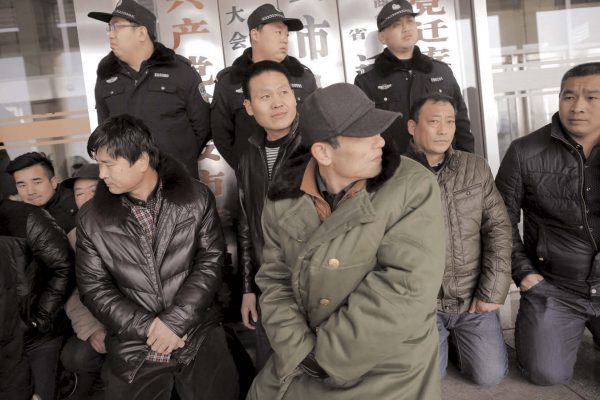QIAN’AN/DONGGUAN (TIP): This year, laborer Fan Fu and 20 or so colleagues working on the Zixia Garden apartment complex in Hebei province have not joined China‘s legion of migrant workers returning home to celebrate new year with their families.
Instead, they have camped in the offices of the property developer’s subcontractor, demanding almost a year’s unpaid wages and too angry and proud to go back to native towns and villages empty-handed.
With China’s economy growing at its slowest in 25 years, more workers face Fan’s predicament and labor unrest is on the rise, a concern for Beijing as it seeks to avoid social unrest even as financial pressures build.
“The developer has kept using the fact that they have no money as an excuse. As of now they haven’t paid us a single penny,” said Fan, who brought others from his home town in the western province of Sichuan to work on the apartments.
“We really don’t have any other options,” he told Reuters in the subcontractor’s offices, crowded with bedding and personal possessions.
The group had earlier petitioned local authorities for redress and staged protests outside government offices in Qian’an, a city in Hebei in China’s north.
When water and electricity were cut to the dorm where they lived, the subcontractor allowed them to move in temporarily.
Fan and about 530 other workers on the apartment project are owed paychecks of between 20,000 and 50,000 yuan ($3,000-$7,500). They said the government had offered each non-local laborer 2,000 yuan in cash if they left for the holidays.
The developer, Qianan City Xinyuan Real Estate, did not respond to Reuters’ requests for comment on the protests and the unpaid wages. The Qian’an government said they were looking into the issue but declined to give details.
While the housing sector is among the worst-hit in China’s economic slowdown, the pain is being felt by blue- and white-collar workers in other industries.
According to Geoffrey Crothall of the Hong Kong-based group China Labour Bulletin, which tracks worker issues, there was a spike in protests in the last quarter of 2015.
Its data show that in December and January, there were 774 labor strikes across China, from 529 in the previous two months, most of them over wage arrears.
Fearful
At a printing factory in the western city of Chongqing, a Reuters reporter was present when a local official visited last week to make sure the boss paid his workers before the Year of the Monkey begins.
The official declined to speak with Reuters, although the boss later said it was an attempt to prevent unrest.
“That’s (unrest) what the government is most fearful of,” said the factory owner, who did not want to be named.
Chongqing authorities gave no immediate response to faxed requests for comment.
China’s senior Communist Party leaders, including President Xi Jinping, have long championed workers’ rights, and are often photographed visiting factories.
The government is concerned that protests over issues like unpaid wages could spill over into broader dissatisfaction at its rule, as it has derived much legitimacy over the past decades from delivering a higher standard of living.
Before the holiday, Beijing issued a notice calling on local authorities to “seriously investigate all incidents of wage arrears, so that migrant workers would be paid in a timely manner and in full,” the state-run Workers Daily newspaper reported.
Over the past few months, however, authorities have arrested at least seven labor activists in Guangdong province in the largest crackdown on organized labor in China in recent years.
(Reuters)
